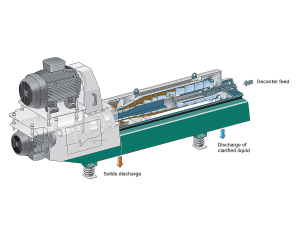GEA launches AI-powered walkover teat sprayer
GEA says that its latest walkover teat sprayer is helping farmers save time and boost udder health.
 The manure decanter separates solids from liquids, creating nutrient-rich fertiliser and irrigation water.
The manure decanter separates solids from liquids, creating nutrient-rich fertiliser and irrigation water.
In a groundbreaking move for dairy farming in New Zealand, Craig Copland has become the first farmer in the country to use GEA’s Manure Decanter system, traditionally used in wastewater and wineries, to enhance environmental sustainability on his Canterbury farm.
Copland and his brother Wayne have successfully integrated GEA’s Manure Decanter system into their farming operations in Chertsey, Canterbury.
“This system has significantly improved pasture irrigation on the farm,” says Craig.
The dairy farm which has been in their family for over 140 years, includes dairy, Black Origin Wagyu beef, cropping, and an apple orchard. With 1500 cows milked through a 60-bail GEA rotary, the system five dairy farm houses 600 cows and 1000 Wagyu beef animals indoors, producing a large volume of effluent.
Before implementing the GEA Manure Decanter, Craig was using a GEA Screw Press separator but faced challenges with irrigation nozzle blockages and high levels of potassium and phosphate in his paddocks.
Daniel Geldenhuys, sales engineer and business development for GEA’s Separator & Flow Technologies, says the company is committed to providing innovative solutions that support sustainable farming practices.
“The GEA Manure Decanter, adapted for use on Craig’s farm, separates solids from liquids, creating nutrient-rich fertiliser and irrigation water. The clarified liquid is fed to a nearby irrigation pond and the solids are dropped underneath the decanter into a concrete bunker,” he says.
The GEA system has reduced irrigation nozzle blockages and allowed for more efficient use of natural fertilisers.
This is the first system of its type in New Zealand.
“Since installing the decanter, we have seen a dramatic increase in irrigation run time from blocking nozzles in less than 8 hours to now endless running times, along with improved pasture growth and reduced synthetic fertiliser use,” says Craig.
“The decanter system has saved time and money on the farm, the other option we looked at was a slurry truck system, which would have involved transporting 24 million litres of effluent in 30,000-litre loads.
“I can operate the system myself, whereas slurry trucks require a driver to transport and spread slurry over fields, and regular maintenance”, says Craig.
The National Wild Goat Hunting Competition has removed 33,418 wild goats over the past three years.
New Zealand needs a new healthcare model to address rising rates of obesity in rural communities, with the current system leaving many patients unable to access effective treatment or long-term support, warn GPs.
Southland farmers are being urged to put safety first, following a spike in tip offs about risky handling of wind-damaged trees
Third-generation Ashburton dairy farmers TJ and Mark Stewart are no strangers to adapting and evolving.
When American retail giant Cosco came to audit Open Country Dairy’s new butter plant at the Waharoa site and give the green light to supply their American stores, they allowed themselves a week for the exercise.
Fonterra chair Peter McBride says the divestment of Mainland Group is their last significant asset sale and signals the end of structural changes.